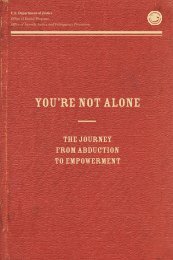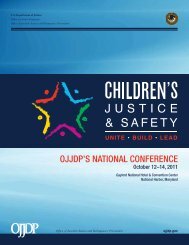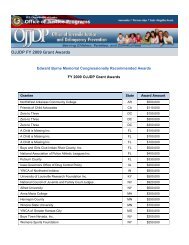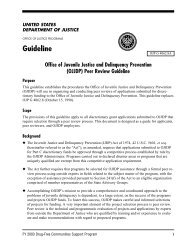OJJDP Family Listening Sessions: Executive Summary - Office of ...
OJJDP Family Listening Sessions: Executive Summary - Office of ...
OJJDP Family Listening Sessions: Executive Summary - Office of ...
Create successful ePaper yourself
Turn your PDF publications into a flip-book with our unique Google optimized e-Paper software.
mentioned the importance <strong>of</strong> system <strong>of</strong>ficials understanding the financial, time, and other<br />
practical constraints families face and working with them to keep lines <strong>of</strong> communication open.<br />
Zero-tolerance policies in schools were cited as misdirected policies that are unnecessarily<br />
driving more children into the system.<br />
Key Comments/Highlights<br />
• As parents, we needed to be consistent and persistent in asking the court to make sure that<br />
our son was getting all the services and education that were available to him. We understood<br />
that because <strong>of</strong> our son’s behavioral problems, the education services <strong>of</strong>fered to him were<br />
limited, but we had to fight for everything he got.<br />
• All children learn differently. When a child is acting out, too many pr<strong>of</strong>essionals jump to the<br />
conclusion that they’re bad kids. I think many youth end up in the juvenile justice system<br />
because they fail in the educational system. [The] mindset is already in place, and as<br />
parents, we have to be more active and be ready for the fight with the school system before<br />
our kids end up in the justice system.<br />
Question 6—Relationship With Child<br />
Did you feel you were able to maintain a meaningful relationship with your child while he<br />
or she was in the juvenile justice system<br />
Most families believed they were able to maintain a meaningful relationship with their children<br />
during their involvement in the juvenile justice system but reported that it required significant<br />
effort on their parts. <strong>Family</strong> members talked about the importance <strong>of</strong> developing relationships<br />
with system <strong>of</strong>ficials, the challenge <strong>of</strong> balancing their work life with making the time to be at the<br />
facility, and having to overcome differential treatment based on economic status or race. <strong>Family</strong><br />
members thought that parental support mechanisms should be implemented to make family<br />
engagement part <strong>of</strong> the process. They recommended that parent advocacy groups should be<br />
supported and recognized as partners throughout a youth’s involvement with the juvenile justice<br />
system.<br />
Key Comments/Highlights<br />
• We were part <strong>of</strong> a parents’ advocacy group, and many <strong>of</strong> our children were in the same<br />
detention facility. When we would visit our son, we’d see other parents and we’d hug and say<br />
hello. This also helped our children to bond with one another. So many <strong>of</strong> the children in the<br />
facility had no family members visiting them, and this would make it difficult for my son. If he<br />
shared any information with us, other kids would retaliate. We need to take care <strong>of</strong> all the<br />
kids in a facility so that they learn to get along with one another. I’m not sure how we do<br />
this, but we need to get to those kids that have no one.



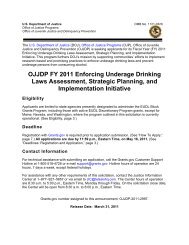
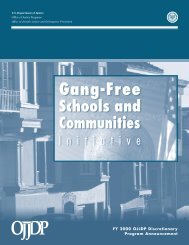
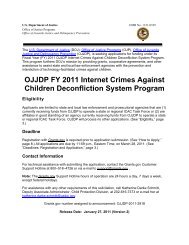
![Chapter 5 [PDF] - Office of Juvenile Justice and Delinquency ...](https://img.yumpu.com/46584340/1/190x245/chapter-5-pdf-office-of-juvenile-justice-and-delinquency-.jpg?quality=85)

